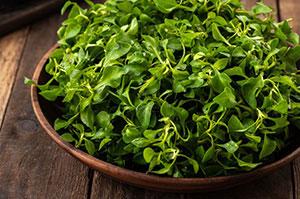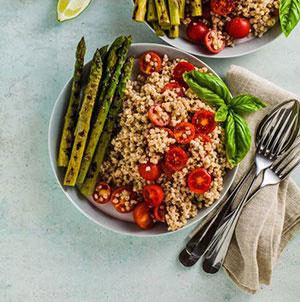Date Posted
Dear Nutrition Enthusiast,
RESEARCH UPDATE: ON THE CLINICAL FRONT
Genetic Variants May Partially Explain Response to Tomato Juice Intake in Men with Prostate Cancer

Tomato product and lycopene intakes are associated with reduced prostate cancer risk. However, changes in plasma or tissue carotenoids in response to tomato product or lycopene intake are heterogeneous, suggesting a possible genetic contribution. To explore whether a set of candidate single nucleotide polymorphisms (SNPs) and other factors, are determinants of plasma and prostatic carotenoid concentrations, Moran and colleagues analyzed data from a dose-escalation study of prostate cancer patients consuming 0, 1, or 2 cans of tomato-soy juice/d for 24 d before prostatectomy. Two SNP genotypes of a gene encoding a carotenoid cleavage enzyme (BCO1) were significant predictors of the change in plasma lycopene, with SNP effects differing in magnitude and direction, depending on the level of juice intake. SNP/tomato juice interactions explained 5.6% of the variation in plasma lycopene responses with a total of 75.7% of the variance explained by a combination of baseline characteristics, diet group, and genetics. Concentration response outcomes to the experimental juice were presented in an accompanying publication. Genetic variants related to carotenoid metabolism may partially explain heterogeneous human blood and tissue responses to lycopene intake.
RESEARCH UPDATE: WHAT’S NEW IN BASIC SCIENCE
Announcements
The Office of Dietary Supplements at the National Institutes of Health (NIH) is now accepting applications (deadline to apply is March 2) for the Mary Frances Picciano Dietary Supplement Research Practicum to take place on June 10-12, 2020, on the NIH campus in Bethesda, MD. This 2.5-day practicum will provide fundamental knowledge about dietary supplements emphasizing the importance of scientific investigation to evaluate the efficacy, safety, and value of these products for health promotion and disease prevention—as well as how to carry out this type of research.
Past Stars in Nutrition and Cancer lectures are available for viewing.
Upcoming Events
February 28, 2020
Advancing Nutrition and Food Science
The Food and Nutrition Board
The National Academies of Sciences, Engineering and Medicine
Washington, DC
(also available as a webinar)
March 17, 2020
Stars in Nutrition and Cancer lecture by Dr. Michael Pollak, McGill University, Energy Balance and Neoplasia: Do Cancers Care if Their Host is Hungry?
National Cancer Institute
National Institutes of Health
Bethesda, MD
(this lecture was cancelled)
April 24-26, 2020
Oncology Nutrition Symposium
Oncology Nutrition Dietetic Practice Group of the Academy of Nutrition and Dietetics
Glendale, AZ
June 28-30, 2020
International Human Microbiome Consortium Congress 2020
Barcelona, Spain
Dietary Compound in Cruciferous Vegetable Inhibits Growth of Prostate Cancer Cells via p53 Mutants

Isothiocyanates, compounds rich in cruciferous vegetables, have been shown to inhibit tumorigenesis in both animal models and numerous epidemiological studies that support their cancer protective role. Phenethyl isothiocyante (PEITC), abundant in watercress, has been shown to selectively deplete mutant p53 by proteasomal degradation pathway in a variety of human cancer cell lines. Here, Aggarwal and colleagues demonstrated that PEITC inhibits the growth of prostate cancer cells with different “hotspot” p53 mutations to differential extents. These mutations are either structural, in which the p53 mutant protein conformation is changed, or contact, in which the DNA binding of p53 mutant is altered. PEITC was found to preferentially inhibit the structural mutants. PEITC also inhibited the growth of prostate xenograft tumors harboring different p53 mutants and reactivated different p53 mutants in vivo. The results suggest that the anticancer activity of PEITC is cancer-type independent, yet it acts in a p53 mutant type-dependent manner. This research sets the stage for novel and practical personalized treatment and prevention strategies for human prostate cancers with p53 mutations.
Obesity-Induced Nuclear Factor Promotes Triple Negative Breast Cancer

Epidemiological and in vitro studies indicate obesity is a risk factor for triple negative breast cancer (TNBC), however, the molecular mechanism remains unclear. Obesity-induced methyl-CpG-binding domain protein 2, variant 2 (MBD2_v2) is crucial for expansion of cancer stem cell like cells and tumorgenicity of TNBC cells in vivo. Teslow and colleagues investigated obesity’s impact on cell signaling pathways by inoculating tumor forming TNBC cell lines into diet-induced obesity (DIO) and control mouse models. Both MBD2_v2 and serine- and arginine-rich splicing factor 2 (SRSF2), necessary for MBD2_v2 expression levels, were higher in tumors that formed more frequently in DIO mice relative to lean control mice. MBD2_v2 over-expression increased and SRSF2 knockdown decreased tumorigenesis of TNBC cells in vivo mouse model. Furthermore, analysis of TNBC tumor samples in African American women patient datasets revealed associations between high tumor MBD2_v2 expression and high body mass index (>30) and elevated relapse rates. This pathway plays an important role in obesity-induced tumorigenicity and warrants further molecular studies to understand the race associated TNBC disparities.
SPOTLIGHT INVESTIGATOR: THOMAS KENSLER

Thomas Kensler, Ph.D. is a Full Member of the Translational Research Program at the Fred Hutchinson Cancer Research Center in Seattle. He received his Ph.D. in toxicology from M.I.T. and completed postdoctoral fellowships at the McArdle Laboratory for Cancer Research, University of Wisconsin and at the National Cancer Institute. His preclinical research demonstrates that activation of KEAP1-NRF2-signaling is a key adaptive response to environmental and endogenous stresses and can be effectively targeted by thiol-reactive small molecules. He has led several clinical trials of inducers of the NRF2 pathway in the Qidong region of China. Recent trials have focused on interventions with broccoli sprout-derived beverages, rich in sulforaphane, as modulators of aflatoxin and air pollutant metabolism and DNA damage. His honors include the AACR-ACS Award for Research Excellence in Cancer Epidemiology and Prevention, the Society of Toxicology Translational Impact Award and the Friendship Award from the People’s Republic of China, their highest award for foreign civilians. Dr. Kensler is the recipient of an R35 from NCI, Targeting NRF2 for Cancer Chemoprevention.
Did You Know? The Global Gluten-Free Grain: Sorghum

Sorghum, Sorghum bicolor, an ancient gluten-free grain, originated from Africa where it traditionally was enjoyed as porridge (ugali, tuwo, karo or mato) or fermented breads, such as kisra. In India, sorghum (jowar) is ground into flour to make high fiber flat breads, while in Japan it is used in foods like pancakes and salmon rice balls. This hearty complex carbohydrate grain is grown in the U.S. and recognized for its high dietary fiber, low glycemic index and rich variety of polyphenols. Sorghum is an excellent source of riboflavin, vitamin B6, thiamin, along with iron, potassium, manganese and magnesium. This all-round versatile, high protein grain can be popped like corn to add crunch to salads, milled into flour to make a favorite gluten-free dish, or simply boiled like rice to offer a nutritious grain alternative. Check out this wintery savory soup, Tuscan Sorghum and Sausage Soup, or simply cook it in a broth to add flavor and accentuate sorghum’s nutty taste while boosting your nutrient intake and improving microbiota and digestive health!